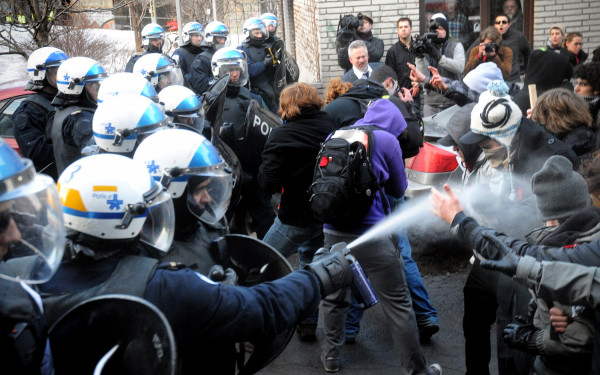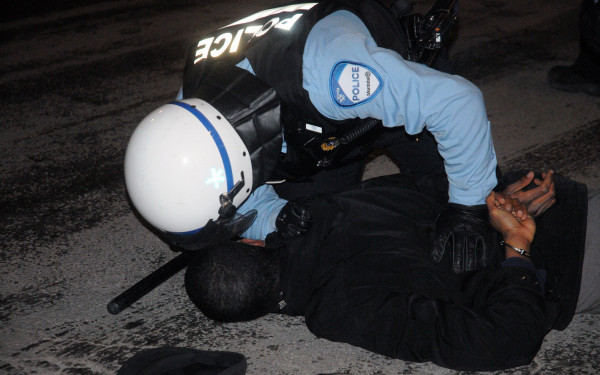Youth in Revolt
CEGEP Students Lead the Charge Against Tuition
Heavily armored riot police banged their shields and batons together in unison, yelling “move!” with every step forward.
Most of the crowd had already dispersed and many of the 120-or-so remaining were scanning alleyways and side streets for an escape route. A few dozen protesters, however, would not budge.
They stood within striking distance of the riot squad, undeterred by the ominous clash of batons against shields or by the two police helicopters fluttering loudly overhead. In the middle of the scrum, a street musician blared synth beats through an amplifier. It sounded like millions of electric circuits screaming, which only added to the intensity.
A deafening explosion rocked the crowd, sending it back about 10 feet. Seconds later two more stun grenades went off, disorienting and frightening the protesters. As if on cue, the riot squad began its charge.
The few who couldn’t flee fast enough were struck with punishing baton hits to the spine, leg or arm. One boy was trampled, beaten and handcuffed.
By now, the police had successfully pushed protesters off Sherbrooke Street and onto City Councillors Avenue in Montreal’s usually sleepy financial district.
As the few remaining protesters cautiously backed up, one of the younger men turned to the fleeing crowd and yelled “Why are you running? We outnumber them!”
Like almost everyone at the March 31 protest, he was a teenager. His face was still round with baby fat. He wore a ski jacket that hung awkwardly from his growing frame. He yelled with the urgency and brashness of an 18-year-old.
Although most of them are still a year or two away from university, CEGEP students have been leading the charge against tuition hikes. In six years, university tuition will rise by 75 per cent in Quebec. Factoring in ancillary fees, students will pay $6,000 a year to attend university—nearly half of the $13,000 the average Quebec student lives off each year.
While university students have lobbied their representatives for months, CEGEP students are approaching the issue with an almost frightening intensity.
On March 31, five CEGEP’s from across the province went on a one-day strike. Thousands of these college students then took to Montreal’s streets calling for a general strike and series of escalating pressure tactics.
“This is just the beginning,” said Arnaud Theurillat-Cloutier to the nearly 3,000 students at the protest. “We will block the streets and highways. We will paralyze Quebec if we have to.”
For hours the protesters rallied through Montreal, screaming, chanting and sometimes dancing with a combination of fury, optimism and creativity. At one point the procession stopped so students could sit down on a particularly busy street, completely halting traffic for blocks—a demonstration of the very real power they wield.
The day culminated in a standoff with police outside the offices of the Conference of Rectors and Principals of Quebec Universities. CREPUQ came out in support of the tuition increases outlined in the Minister of Finance’s 2011-2012 budget, a plan that will also increase user fees and cut public services.
The crowd outside of the glass tower was supporting a sit-in taking place in CREPUQ’s offices. Within minutes, police began dispersing protesters with mace and the day erupted in violence, with at least one student being hospitalized and six arrested.
Just one week earlier, another protest organized by L’Association pour une solidarité syndicale étudiante ended with a fight between students and police.
That time, CEGEP students managed to infiltrate the Finance Minister’s Montreal office through a fire escape. In what was a moment of sheer chaos, students clashed with building security and were even fought off by secretaries using binders. One student was taken to the hospital after having his head smashed through a glass door by a security guard.
Using mace, riot police managed to scatter the students back onto the streets but not before they unrolled a giant banner directed at Minister of Finance Raymond Banchand. “Shove your tuition increases up your ass Bachand,” it read.
“The strikes and protests are just a starting point. We need to keep applying pressure on the Charest government,” said Cedric Audy. Audy, whose CEGEP did not join the strike, chose to skip class and bus into Montreal from Lennoxville to attend the rally. “If people are being excluded from a higher education, who is going to fill the void left by retiring baby boomers? Education is a right and we won’t back down on this.”
Jessie Ducharme is studying social sciences at CEGEP de Saint-Jérôme, where 70 per cent of students voted in favour of the one-day strike.
“If we don’t mobilize now we’ll lose,” said Ducharme. “I honestly don’t know if I’ll be able to afford university at this rate. And I’m not alone. You hear people worrying about tuition costs in classrooms across Quebec. It’s not just about us—this austerity budget is cutting away at the province’s safety net. It’s marginalizing the most marginalized.”
With more protests and longer strikes slated for the fall, the Service de Police de Ville Marie is looking to adapt to the rising tide of student activism sweeping through Quebec.
“We have to learn how to deal with these budget protests,” said SPVM spokesperson Dany Richer. “This won’t be the last one.”
This article originally appeared in Volume 31, Issue 29, published April 5, 2011.

01__900_598_90.jpg)
02__900_598_90.jpg)
03__900_598_90.jpg)
04__700_1054_90.jpg)




